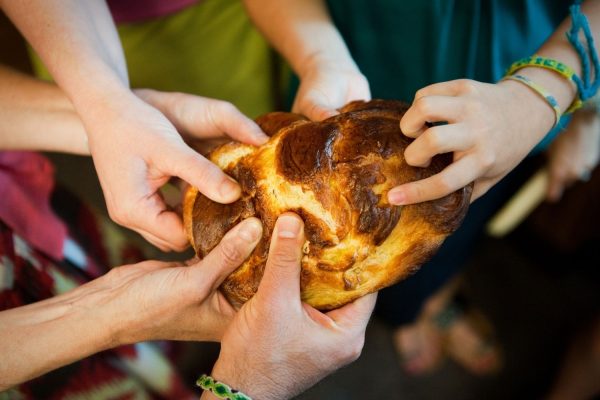Counting the Omer traditionally consists of five distinct steps: opening with a meditation, saying the blessing, reciting the count, reading Psalm 67, and closing with a prayer on behalf of those still in captivity. This ritual is typically practiced at night, and in some traditional communities, it is a custom not to work from sunset until dawn during the period of counting the Omer. And, among Sephardim, there is an especially strong custom that women not work at night during the Omer.
1. Meditation before counting
The following traditional meditation is meant to be said in the first-person-singular form. Nevertheless, almost no prayer book offers women this meditation in “grammatically correct Hebrew” because it is written exclusively in masculine language (and Hebrew is a gendered language). Kolot is pleased to offer this meditation in both masculine and feminine forms.
Women say
הִנְנִי מוּכָנָה וּמְזֻמָּנָת
Men say
הִנְנִי מוּכָן וּמְ זֻמַן
All continue
לְקַיֵּם מִצְוַת עֲשֵׂה שֶׁל סְפִירַת הָעֹמֶר כְּמוֹ שֶׁכִּתּוּב שֶׁכָּתוּב בַּתּוֹרָה וּסְפַרְתֶּם לָכֶם מִמָּחֳרַת הַשַּׁבָּת מִיּוֹם הַבִיאֳכֶם אֶת עֹמֶר הַתְּנוּפָה שֶׁבַע שַׁבָּתוֹת תְּמִימוֹת תִּהְיֶנָה. עַד מִמָּחֳרַת הַשַּׁבָּת הַשְּׁבִיעִית תִּסְפְּרוּ חֲמִשִּׁים יוֹם
Feminine: Hineni mukhanah umzumenet lekayem mitzvat aseh shel sefirat ha’omer kemo shekatuv batorah
Masculine: Hineni mukhan umzuman lekayem mitzvat aseh shel sefirat ha’omer kemo shekatuv batorah
Continuation of both: u-s’fartem lakhem mi-mokhorat ha-Shabbat mi-yom havi’akhem et-ha’omer ha-tenufah sheva Shabbatot temimot tiheyenah: Ad mi-mokhorat ha-Shabbat ha-shevi’it tisperu khamishim yom ve-hikravtem minkhah khadashah l’Adonay.
Here I am, ready and prepared to count the Omer, as it is written in the Torah: “You shall count from the day following the day of rest, from the day you brought the sheaf of the wave-offering, seven full weeks shall be counted; you shall count fifty days to the day following the seventh week.”
2. Say the blessing
Feminine God language
בְּרוּכָה אַתְּ יָהּ אֱלֹתֵינוּ רוּחַ הָעוֹלָם אֲשֶׁר קִדְּשָׁתְנוּ בִּמְצַוְּתָהּ וְצִוָּתנוּ עַל סְפִירַת הָעֹמֶר
Masculine God language
בָּרוּךְ אַתָּה אֲדֹנָי אֱלֹהֵינוּ מֶלֶךְ הָעוֹלָם אֲשֶׁר קִדְּשָׁנוּ בְּמִצְוֹתָיו וְצִוָּנוּ עַל סְפִירַת הָעֹמֶר
Feminine God language: B’rukhah at Yah Eloteynu ruakh ha’olam asher kideshatnu bemitzvoteha vetzivatnu al sefirat ha’omer.
Masculine God language: Barukh atah Adonay Eloheynu melekh ha’olam asher kideshanu bemitzvotav vetzivanu al sefirat ha’omer.
Blessed are you, Eternal One our God, source of all life, who has made us holy with your mitzvot, and commanded us concerning the counting of the Omer.
3. Recite the count
הַיוֹם ___ יוֹם, שֶהֵם ___ שָבוּעוֹת וְ___ יָמִים לָעוֹמֶר
Hayom ___ yom, she-hem ___ shavu’ot v’___ yamim la-omer
Today is the ___ day of the Omer, which is ___ weeks and ___ days of the Omer.
4. Read Psalm 67
Psalm 67, which consists of seven verses and, in the original Hebrew, forty-nine words (like the number of days we are counting), is central to the counting of the Omer, allowing us to see that the earth is already blessed and that people in many different ways have come to this understanding.
God, bless us with your grace and care, and make your face smile on us!
For then the earth will recognize your presence, and all the nations will know your saving power.
May all nations praise you, O God, may all nations praise you!
Let the nations shout and sing for joy, you grant justice to the peoples, on earth you guide the nations.
May all nations praise you, O God, may all nations praise you!
The soil has given its harvest; our God has blessed us.
May God continue to bless us; and let God be embraced to the very ends of the earth.
5. Close with a prayer
לְזֵכֶר יְצִיאַת מִצְרַיִם. יְהִי רָצוֹן שֶׁיְּשֻׁחְרְרוּ כָּל הַשְּׁבוּיִים הֵן בַּגּוּף הֵן בַּנֶּפֶשׁ וְשֶׁנְּשַׁמֵּשׁ כְּעֵזֶר לְזְרֹע אֱלֹהִים הַנְּטוּיָה לִקְרַאת חָרוּת
Li-zekher yetzi’at mitzrayim yehi ratzon sheh-yishukhreru kol ha-shevuyim hen ba-guf, hen ba-nefesh vi-sheh-neshamesh ke’ezer lizro’a Elohim ha-netuyah likrat kherut.
In remembrance of the Exodus from Egypt, we pray that you release all whose bodies and spirits remain captive and enable us to extend Your outstretched arm in the process of liberation.











One Response
thank you for this lesson .